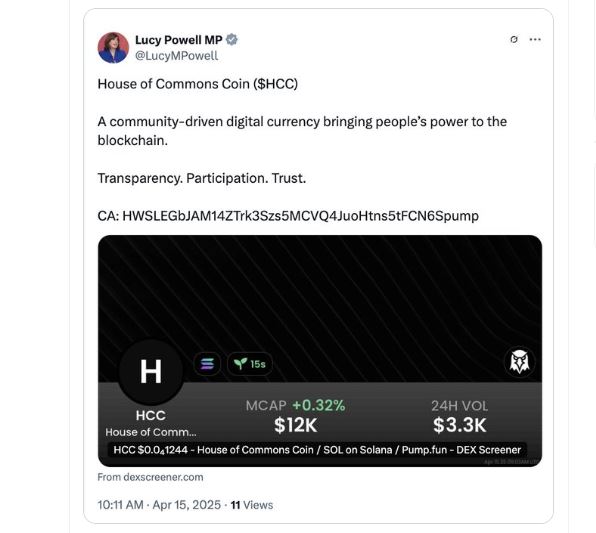
In a surprising cyber incident on Tuesday, UK minister Lucy Powell’s verified X (formerly Twitter) account was hacked. The attackers used her profile to promote a fake cryptocurrency named “House of Commons Coin” ($HCC). The scam raised alarms about growing threats of online impersonation targeting public figures in the UK.

What Happened?
On the morning of Tuesday, April 9, 2025, several unusual tweets appeared on the official X account of Lucy Powell, the Leader of the House of Commons. These posts claimed the launch of a new digital currency, the House of Commons Coin ($HCC), and included promotional slogans like:
“A community-driven digital currency bringing people’s power to the blockchain.”
“Transparency. Participation. Trust.”
One tweet also mentioned that the “official crypto coin” was now live and included a contact address for users.
The tweets featured the House of Commons portcullis logo, making the posts appear official and credible. However, the information was entirely false.

How Did Authorities Respond?
A spokesperson for Lucy Powell quickly confirmed that the minister’s personal X account had been hacked. They stated:
“Lucy Powell’s personal X account was hacked this morning. Steps were taken quickly to secure the account and remove misleading posts.”
All the tweets promoting the fake crypto were deleted shortly after being posted.
A House of Commons spokesperson also responded, stating:
“UK Parliament takes cyber security extremely seriously. We provide advice to users — including members — to make them aware of the risks and how to manage their digital safety.”
The spokesperson also confirmed that there is no official cryptocurrency linked to the UK Parliament or the House of Commons.
Not the First Case
Lucy Powell is not the only public figure who has been targeted by this kind of scam. Other popular people in the UK have also had their X accounts hacked recently to promote fake cryptocurrencies.
In January 2025, Laura Kuenssberg, a well-known BBC political presenter, had her X account hacked. Her profile was used to promote a fake “BBC Coin,” which scammers called the next big thing in digital finance.
In February 2025, Nick Robinson, another BBC journalist, was also hacked. His account was used to promote a fictional coin linked to BBC’s Radio 4 Today programme.
These attacks follow a clear pattern. Scammers break into verified, trusted accounts. They post fake crypto messages that look real. They try to trick people into believing these are official launches.
Was It a Scam?
According to experts, this kind of attack is known as a “pump and dump” scheme.
Luke Nolan, a senior research associate at CoinShares, a digital asset firm, explained how these scams work:
“People create coins and buy up most of the supply before releasing it to the public. Then, they wait for unsuspecting users to invest and quickly sell their tokens for profit. These scams can be very profitable.”
In this specific case, Nolan analyzed the data and found only 34 transactions were made before the tweets were deleted. The total amount gained by the attackers was estimated to be around £225. He added:
“It appears the tweet got deleted quite quickly, which meant the deployer did not really get a chance to extract that much from people who might have invested in the coin.”
Cybersecurity in Politics: A Growing Risk
This incident raises an important question: How secure are the accounts of public leaders?
Social media is now a key tool for politicians, journalists, and other public figures. People trust these accounts. When a verified person says something, the public tends to believe it, especially when the posts look professional.
That trust can be dangerous if hackers take control of an account, even for a short time.
More cyberattacks like this could lead to public confusion, financial loss, or even political damage.
X Platform Under Pressure
After several high-profile hacks, X (formerly Twitter) is under pressure. Critics say the platform needs to do more to protect accounts, especially those of public officials and media figures.
Some have suggested better two-factor authentication (2FA), faster alert systems, and improved tools for account recovery. Others say X should monitor suspicious crypto promotions more closely, especially if they are posted by verified accounts.
For now, it seems that the platform acted fast enough to prevent major harm. But many believe this is a warning sign for bigger attacks in the future.
The hacking of UK Minister Lucy Powell’s X account to promote a fake cryptocurrency is the latest in a series of similar attacks in the UK. Though the financial impact was small, the incident serves as a warning about how quickly and easily trust can be abused online.
As more crypto scams use the identities of trusted figures, both public figures and ordinary users must be cautious. Cybersecurity, especially in the digital age of politics and finance, must be a top priority for everyone.























